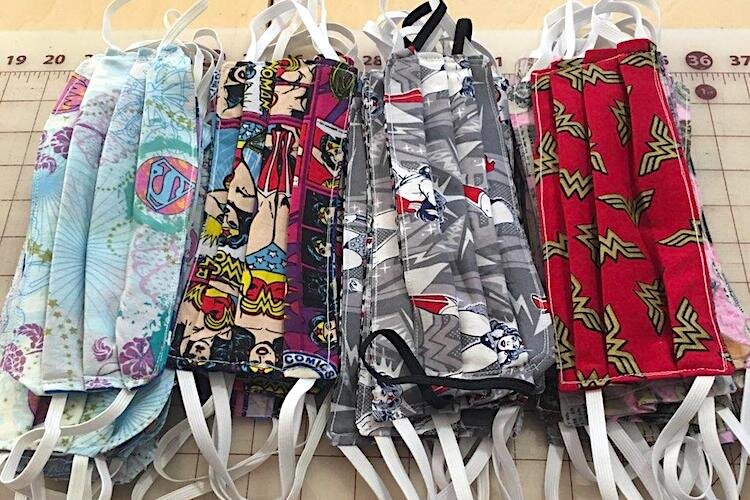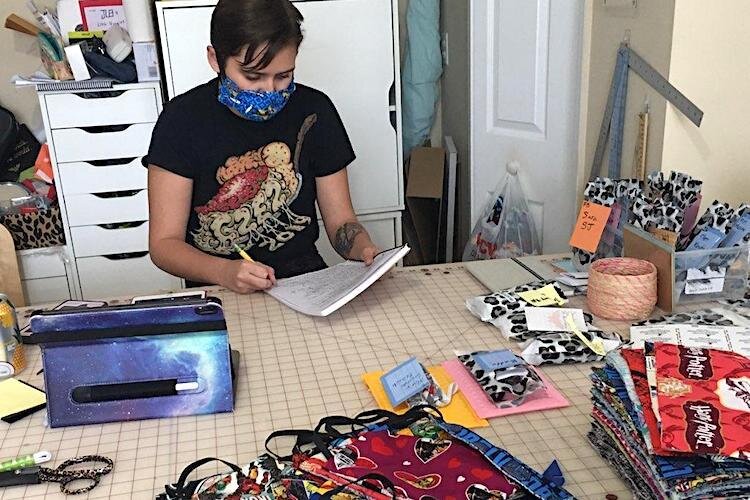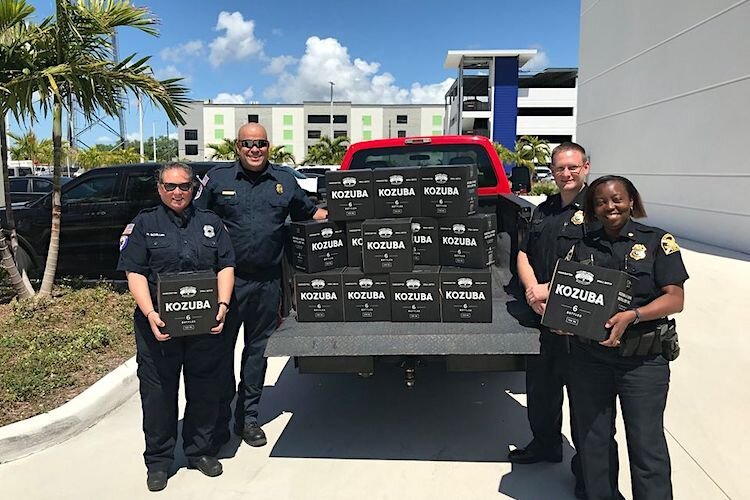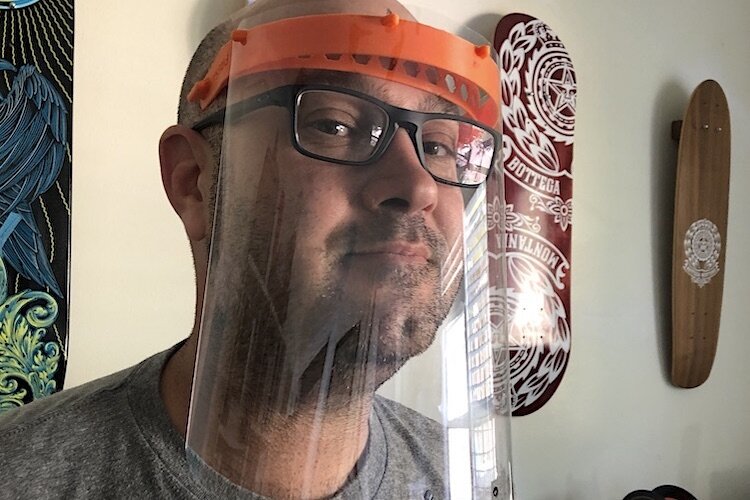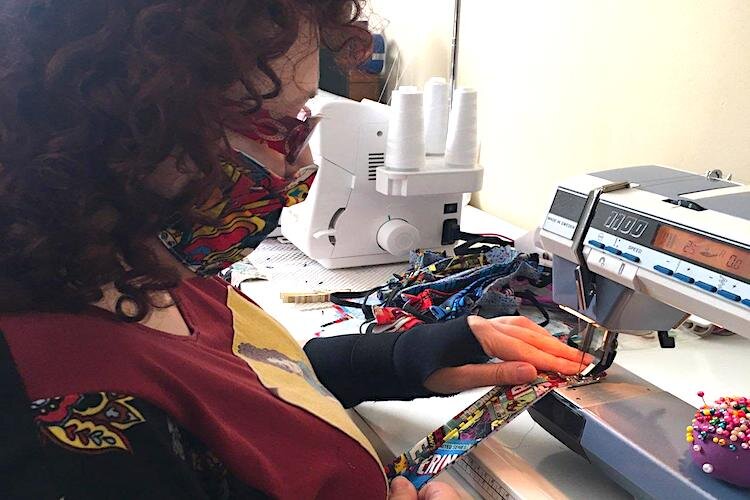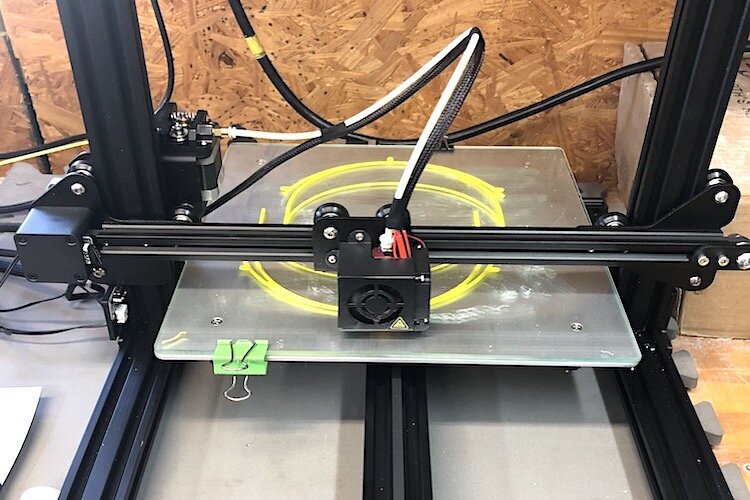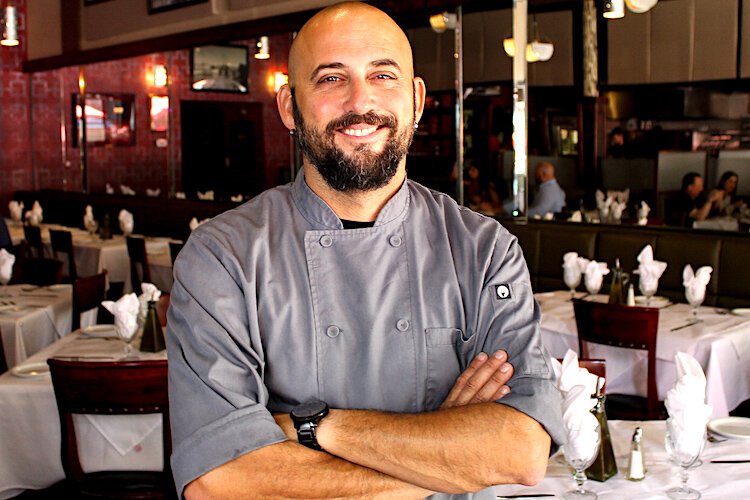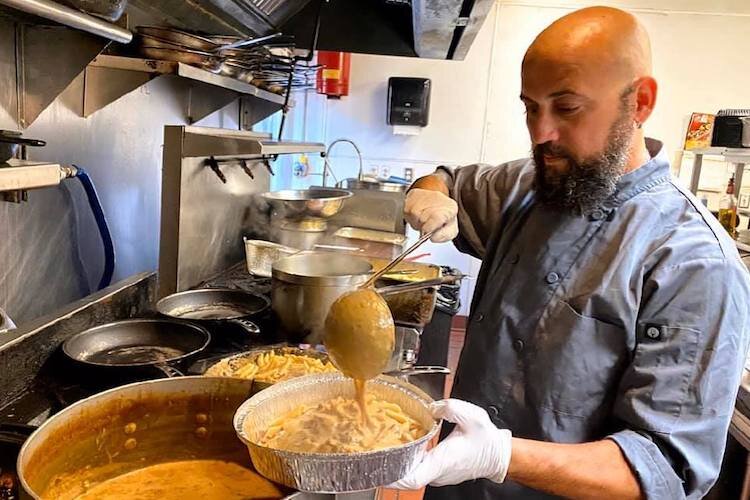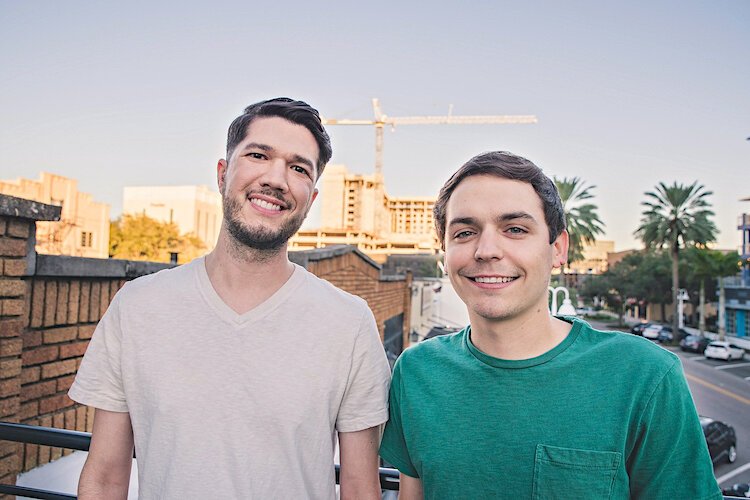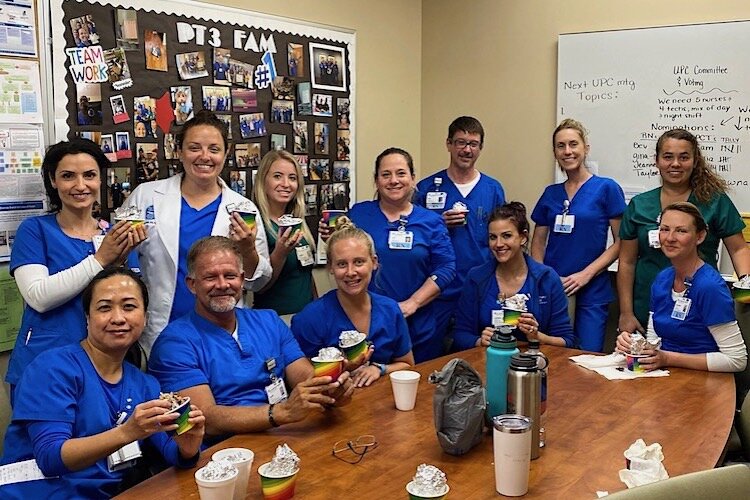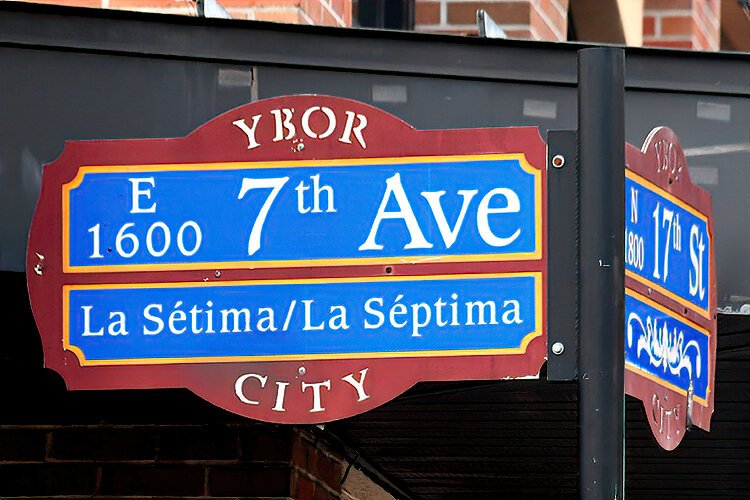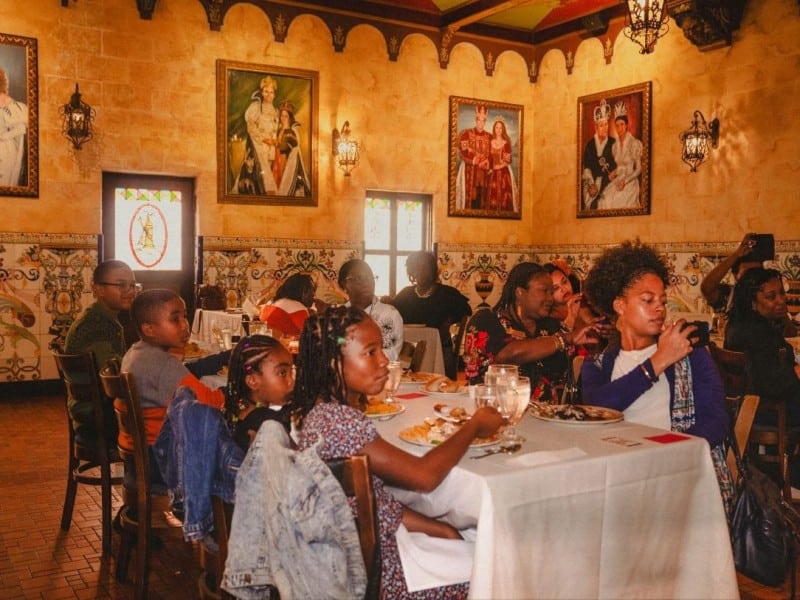Local entrepreneurs get creative in support of healthcare workers, filling community needs
Making 3D printed face shields and superhero masks, feeding healthcare workers, and turning breweries into manufacturers of hand sanitizer are among the Tampa Bay Area's creative responses to the risks posed by COVID-19.
Jonathan Barnes, chairman of the fine arts and humanities department at St. Petersburg College, was brainstorming with a friend who is an ER doctor.
“We were talking about the lack of supplies to protect healthcare workers and how there wasn’t enough stock to fill the immediate need,” says Barnes. “We were wondering what we could do about it.”
Barnes decided to do a Google search to see what he could find. An open-source design for a face shield came up. It was a pattern from Prusa, a Czech manufacturer of 3D printers.
Barnes did a test print. It worked. He made a few tweaks to improve the design. And suddenly he was ready for production.
“Never in my wildest fantasy did I think that as a college professor I would be making face shields for the COVID-19 crisis using a 3D printer,” says Barnes. “This is what artists do. We are good at creative problem solving, conceptual development, and critical thinking skills. There’s a problem, we create solutions.”
Barnes says the most tedious part is cutting the clear part of the shield by hand.
“It’s made with Mylar stencil film. I’m cutting everything on my work table using a ruler and an X-Acto knife. Then I’m punching holes by hand using a three-hole punch,” he says.
The face shields are not high-tech or designed for use in surgical procedures. But they’re effective in preventing health care professionals from being sneezed or coughed on, Barnes says.
Initially, he had been using his own 3D printer to create the face shields. Then St. Pete College gave him permission to bring two additional printers home from the college’s Humanities and Fine Arts department.
“My bosses at the college were gracious enough to let me use the printers that we had in our art lab,” says Barnes.
For the past two weeks, he’s been making about four to six shields every four hours.
Recent days have been pretty long, he says. In the past two weeks, he estimates that he’s produced about 120 masks. He’s making them while still continuing his full-time job teaching art classes online.
Some of the shields were initially mailed out to family and friends around the country. Others have been given locally to physicians and other healthcare workers.
The project has really snowballed, says Barnes. He and his wife placed a post on their Facebook pages about what they were doing. Then St. Petersburg College shared it and the Florida Department of Education picked it up.
“Everyone has been asking how they can help,” says Barnes. “Someone dropped off eight 3D printed parts at my house last night and another eight were dropped off this morning. It really does take a village.”
He wants to give special recognition to Sun Works Plastic in Clearwater for cutting a quantity of Mylar film and dropping it off at this house. And to Kyle Silcox and John Olivia, both of whom have 3D printers of their own and are helping print a portion of the face shield. “They’re putting them in a bag, driving over to my house and hanging them on my chain link fence. Then I assemble everything,” says Barnes.
In a news release sent out by St. Pete College, Barnes says he’ll continue to make and donate the shields as long as he has the materials to do so.
“It seems like the right thing to do,” he says. “Those people are the front line heroes going into battle without proper equipment.”
Superhero masks to the rescue
By day Sandra Botero teaches high school Spanish with the Florida Virtual School, an accredited public online school serving students kindergarten through grade 12. At night, she’s a fashion designer with her own business called Heroicouture.
Since the outbreak of coronavirus, Botero has shifted direction to focus on making masks for healthcare professionals and first responders.
But her masks aren’t the typical white, black, or green aka drab ones you might expect. As the owner of a creative fashion design business, she’s adopting the new need to her traditional model for success: Superheroes.
Heroicouture caters to the “overlooked demographic of chic geeks,“ Botero says. The clothing and accessories she makes use fabrics with superhero caricatures from popular comic books. Her favorite? Wonder Woman.
Her husband Paul Mounts is a comic book color artist whose work has appeared in Marvel, DC Comics, and Top Cow, among others.
Responding to COVID-19, Botero has created hundreds of colorful “Super Hero” masks and given them to healthcare professionals locally, as well as shipped them around the country and to Canada. She’s even had a request from England.
“I put it out there on Facebook and Instagram and people have responded,” says Botero. “I didn’t expect this many people to be asking for help, but I’m glad. I’m donating my time and supplies and only asking for help paying for shipping.”
How did she come up with the idea?
“I have a lot of friends in the medical field,” says Botero. “My sister is a physician’s assistant and my father was a long-time cardiac surgeon in St. Pete. So I grew up knowing a lot of doctors in the area. And I kept seeing on the news shows that there was a real need for protective masks.”
During one of the shows, Botero heard about a hospital in Indiana that was not only asking people in the community to make masks, but they had posted a tutorial on how to make them. She went to the website, printed out the pattern, and set up shop.
“I had this huge amount of colorful fabric,” says Botero. “I realized that this is why I’ve been hoarding it without knowing why.”
The masks she’s making are not the N-95 Masks meant to provide high-level protection from particles and contaminants, but she figures and the experts agree that some layer of protection is better than none.
“One physician who contacted me said they will be using my masks on top of their hospital-supplied N-95 masks,” says Botero. “My masks will help preserve and protect the hospitals’ masks since they’re in such short supply right now.”
Doing what she can to offer her support is important, says Botero.
“At this time we have to remember we are a global community, part of a global world. We’re not singular but part of this giant puzzle,” says Botero.
All of her masks are going exclusively to people in the medical field — nurses, physicians, paramedics, emergency medical technicians, and housecleaning personnel in hospitals.
“It’s especially rough in New York and New Jersey, where some of the stories are heartbreaking,” says Botero. ”A nurse in New Jersey said they were using garbage bags because they didn’t have the equipment. An OG/GYN from New York said they were dealing with many pregnant women who have COVID-19 and they’re not sure what the effect will be on the baby. I put them on the top of my list to send masks.”
Putting breweries and distilleries to work for good
Not long after news stories began breaking about the shortage of hand sanitizer, Leigh Harting, co-owner of 3 Daughters Brewery with her husband Mike in St. Petersburg, decided to see what they could do about it.
“We’ve spent $150,000 over the last five years putting resources into developing our own onsite lab and we have one of only two Tobacco Trade Bureau-certified chemists in the state,” says Harting. “We thought, hey, we have a chemist, a lab, a facility to sterilize the bottles, and the raw ingredients.”
The brewery announced that they would begin making hand sanitizer about 4 p.m. on a Wednesday afternoon in March. By midnight the news had gone viral. And by Thursday morning, hundreds of people were showing up at the brewery looking for hand sanitizer, says Harting.
They quickly realized they had to reverse course and set up appropriate channels of distribution, not only to allow for social distancing, but to make sure that the hand sanitizer would benefit those in most critical need — first responders, hospitals, retailers, and high-risk individuals.
In one week, they made and donated more than 4,000 bottles of hand sanitizer, says Harting.
Within a week, the supplies they needed to make more — isopropyl alcohol, hydrogen peroxide, sonogram gel and bottles — had run out.
We’ve sent out a plea for help,” says Harting. “Everyone’s been trying to pitch in and set up a supply chain for us.”
By publication time, the brewery had established a supply chain and ramped up production to increase the quantity. “We worked with local leaders to make it happen,” says Harting.
Since then, they’ve distributed bottles to more local hospitals, including Johns Hopkins All Children’s in St. Petersburg and Moffitt Cancer Center in Tampa. The Tampa Police Department had also come by to pick up bottles for the local police force.
“It’s nice to do something good for the community during such a time of needs,” says Harting.
Kozuba & Sons, a St. Petersburg-based craft distiller of vodka, whiskey, and liqueurs using recipes from their native Poland, is also moving full speed ahead to make hand sanitizer.
They’ve halted production on artisanal spirits and are fully focused on making hand sanitizer following guidelines set by the World Health Organization, which requires 80 percent alcohol content, says Matthias Kozuba, owner and proprietor.
Within a week of starting, they had delivered their first 1,000 bottles, about 62.5 gallons, to The City of St. Petersburg Office of Emergency Management for distribution to first responders.
They had also provided hand sanitizer to several local charitable organizations, including the St. Petersburg Free Clinic, CASA, Daystar Life Center, and Brentwood at St. Petersburg. For other agencies looking for help, they’ve posted an online request form on their Facebook site.
By the end of March, they were running short on polyethylene containers, prompting a call for wholesale amounts of eight-ounce bottles, gallon containers, and spray bottles.
They were also asking people to sign a petition urging Congress to assist distillers around the country by temporarily waiving Federal Excise Tax as they shift their business model to hand sanitizer.
On their Facebook page, Kozuba & Sons reports: “The Senate has passed a temporary Federal Excise Tax waiver for undenatured alcohol for distillers producing hand sanitizer as long as distillers follow FDA guidance. For this measure to go into effect, it now needs to pass in the House and FDA. Please sign the petition at this link to urge Congress to provide us and other distillers around the country this much-needed relief as we all produce hand sanitizer!”
Stepping up food delivery
Anthony Close and Brian Zucker co-Founded an urban development blog called St. Pete Rising. It’s an online platform to promote local small businesses and a way to raise awareness about new developments coming to downtown St. Petersburg.
But during the COVID-19 crisis, “we have to pivot a bit,” says Zucker.
They’ve launched an online fundraiser that serves two important goals: to thank healthcare workers who are working so hard during COVID-19, and to give a financial boost to local restaurants that have been forced to close onsite dining and go to take-out or delivery only.
“Right now we’re more concerned with whether our favorite coffee shop or restaurant will be able to stay in business,” says Zucker. “At the same time, we want to feed the local healthcare workers who are on the frontlines.”
Zucker launched his online fundraising campaign on March 24, and overnight raised $2,500 from the community.
By the end of March, they had raised over $22,000 and delivered hundreds of meals. “We hope to be providing thousands more in the weeks to come,” says Zucker.
“It’s a grassroots community effort, every dollar counts,” says Zucker. “St. Pete prides itself as a city that supports local business. We are militant local. Now’s the time to put our money where our mouth is.”
The idea behind the campaign, says Zucker, is to team up with a different local restaurant every day, seven days a week, to bring lunch to local healthcare workers. The donations are used to pay the restaurants for the meals.
For more information, visit these websites:
- Heroicouture
- Gratzzi
- 3 Daughters Brewing
- Kozuba & Sons Distillery
- St.Pete Rising
- Prusa Face Shield Open Design
- Jonathan Barnes

